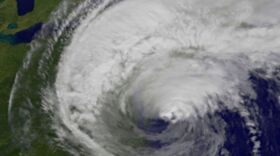On Tuesday, a New York State Senate panel discussed the state's response to climate change with scientists, environmental advocates and residents affected by Hurricane Sandy flooding. The forum comes amid comments by top state Republicans questioning humanity’s role in climate change.
The ranking member of the NYS Senate Environmental Conservation Committee, Manhattan Democrat Brad Hoylman, convened the panel after two top Republican senators said recently that this winter's cold temperatures and snow prompted them to question whether climate change is occurring.
Senator Holyman says climate change is an issue that will have a dramatic negative impact on the future of humanity. “Climate change is one of the most defining and important issues of our time. Just today President Obama is declaring climate change a national security concern. So it’s very important that we here in New York, in the legislature, do everything we can to make sure that New York State has a climate plan that has teeth. The climate action plan is going to reduce New York’s carbon emission output by 80 percent by the year 2050.”
Environmental Advocates of New York Executive Director Peter Iwanowicz says people have a hard time understanding the nature and level of destruction that occurs from climate change, so the natural inclination is to deny its existence. “What the forum yesterday was really about was trying to bring to light the impacts that are happening to New Yorkers now, the huge human toll that it has and the costs that are out there now so we can get the issue at hand. Rather than debating about the issue actually start reducing the pollution that’s fueling climate change.”
Iwanowicz adds that baseline conversation about climate change and its impact has been missing in Albany, even after Gov. Cuomo termed it the “new normal...” “There have been no debates on the issues in the state Senate. Bills that pass the Assembly don’t get traction. So what Senator Hoylman brought together yesterday was actually a good conversation about not only the impacts from climate scientists, but he brought together people who have been impacted by extreme weather events and tried to put more of a human face on what’s going on. To begin the conversation somewhere, to start swaying some of those more recalcitrant members of the state Senate into a category where they understand climate change is happening. The impacts are real. To deny it is putting lives at risk.”
Director of Government Relations for the Nature Conservancy in New York Jessica Ottney Mahar told the panel that climate change is already transforming life on the planet. “This is hopefully the beginning of a new stage of conversations in Albany about climate change. A few weeks ago we saw a forum at Cornell hosted by Senator O’Meara and Assemblyman Englebright on climate change and its impact on the agricultural sector. So there are several legislative dialogs going on about this issue. I’m hopeful that as these things continue to happen they add up to an opportunity for various stakeholders to come together and think about what New York State needs to be continuing to do and what more New York needs to do to really be a part of the solution.”
Adirondack Mountain Club Executive Director Neil Woodworth was unable to attend the hearing, but is familiar with Senator Hoylman’s environmental record. He believes the Senator is building support and consensus for legislative measures to address climate change. “To build resiliency in our infrastructure across the whole gamut of government infrastructure so that we are ready as climate change begins to change the climate and weather in New York State. He is working with a Senate majority that is going to need more adherents and supporters of response to climate change than currently are in the Republican majority at this point.”
Senator Hoylman said the Climate Action Plan to reduce carbon emissions by 80 percent by 2050 must include banning the combustible engine, replacing it with electric vehicles and turning to renewable energy sources.




